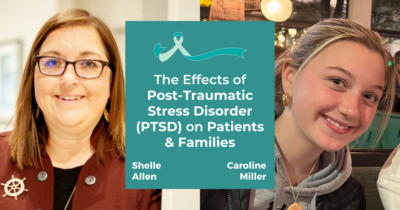Post-Traumatic Stress Disorder (PTSD) in Flu Patients and Families

What is PTSD?
Post-traumatic stress disorder (PTSD) can develop for those who have experienced a shocking, scary, or dangerous event. It is natural to feel afraid during and after a traumatic situation. Fear is a part of the body’s “fight-or-flight” response, which helps us avoid or respond to potential danger. People may experience a range of reactions after trauma, and most recover from initial symptoms over time. Those who continue to experience problems may be diagnosed with PTSD.
Signs and Symptoms
Symptoms of PTSD usually begin within three months of the traumatic event, but they sometimes emerge later. To meet the criteria for PTSD, a person must have symptoms for longer than one month, and the symptoms must be severe enough to interfere with aspects of daily life, such as relationships or work. The symptoms also must be unrelated to medication, substance use, or other illness.
The course of the disorder varies from person to person. After a dangerous event some people recover within six months, while others have symptoms lasting one year or longer. People with PTSD often have co-occurring conditions, such as depression, substance use, or one or more anxiety disorders.
A mental health professional with experience helping people with PTSD, such as a psychiatrist, psychologist or clinical social worker can determine whether symptoms meet the criteria for PTSD.
After a Hospital Stay
Researchers at Johns Hopkins University studied the effects of hospital stays and the correlation with PTSD. They looked at individuals hospitalized with life-threatening lung injuries and spent time in the intensive care unit (ICU). In the two years following being discharged, researchers found that just over one in three individuals experienced PTSD symptoms, and individuals who had a history of depression were more likely to experience PTSD. Patients experience flashbacks of their experience. Many also experienced fazes of delirium in which they had “nightmare-like”‘ delusions and distorted memories.
The researchers say the high prevalence of PTSD after an ICU stay underscores the importance of following up with patients after they leave the hospital.
Influenza and PTSD
For individuals like flu survivors Caroline Miller and Madi Allen, their lengthy hospital stays left a lasting impact and continue to be a difficult experience to process. Caroline and Madi were hospitalized for an extensive period of time because of the flu, and both faced a lengthy recovery following their battle with influenza. Both girls’ experiences of being hospitalized with influenza were traumatic for them and their families.
Caroline, now 16 years old, talks about the anxiety she feels when she has just a minor cold. Any flu-like symptoms usually make her nervous, as she worries it will quickly escalate out of the blue as it did ten years ago.
When I get a cold, I am definitely nervous that I’ll have to go to urgent care or have to take a bunch of different medications… I don’t remember that much from when I was sick because I was so young, but I know that any time I get even a slight cough, my mom watches me really closely.
There is a heightened awareness about the flu in the Miller household because of how sick Caroline was in 2012.
Shelle Allen, Madi’s mother, discusses her difficulty and tremendous guilt as she watched her daughter fight for her life.
I watched my 12-year-old daughter’s lifeless body hooked up to so many tubes that I lost count, and I could do nothing to help her. Guilt started to sink in. I was her mother; I should have protected her by making her flu vaccination a priority.
Shelle was by Madi’s side every second of her 96-day hospital stay. As Madi began her recovery outside of the hospital, Shelle’s anxiety persisted, “My doctor diagnosed me with PTSD. This was confusing because I was not the one sick. However, she explained, “I was the one watching the traumatic experience unfold. I lived in fear for those first 96 days, and then the fear only worsened when we returned home. I was anxious and was always on permanent alert.”
Some common symptoms of PTSD often are overlooked or misdiagnosed. These symptoms can be overlooked as they are not as severe as some of the more well-known symptoms associated with PTSD, such as nightmares, suicidal thoughts and self-destructive behavior.
It is imperative to recognize these symptoms not only in the patient who was hospitalized but also in close family members. It is common for family members to experience PTSD after a traumatic event involving a loved one. Some studies show that family members of hospitalized individuals experience similar levels of PTSD from their experience.
Today, the Miller and Allen families are educating others on how severe the flu can be and the impact on everyone in the family. They emphasize the importance of receiving an annual flu vaccine at the beginning of fall. When any family member presents symptoms, they test for the flu so they can begin treatment as soon as possible if needed. They hope that other families won’t experience what they have been through.

